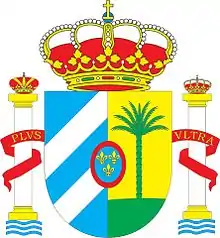Spanish Cuba movement
Spanish Cuba (Cuba española) is a contemporary citizens' initiative, launched in 2008 from an idea of José Ramón Morales (Caimito, Cuba, November 5, 1954, Miami - May 28, 2012).[1] It pleads for the re-integration of Cuba to the Spanish kingdom as an overseas territory upon mutual agreement between Cuba and Spain, followed by a referendum to be approved in both nations.
 MRCE | |
| Type | Non-profit organizations |
|---|---|
| Headquarters | Paris, France |
Official language | French, English, Spanish |
| Leader | Ferrán Núñez |
| Website | Comunidad Autónoma de Cuba |
History
José Ramón Morales'[2] blog "Autonomous Community of Cuba, Spain," has received over a million visitors[3] since its inception and has generated bitter controversy in the network.[4][5][6][7][8] The idea of the reunification of the island of Cuba with Spain is connected with liberal and autonomist ideas that coexisted throughout the nineteenth century with the ideal of independence.
The entry of the United States in the Spanish–American War and its support for separatist Spaniards,[9] changed the destiny of the island, which in 1898 came under American influence.
Current historical research[10] tints Manichean positions developed by Marxist doctrine in Cuba,[11][12] aimed to prove the inevitability of the revolutionary movement that started in 1868 with the Grito de Yara,[13] and concluded a hundred years later with the seizure of power by Fidel Castro, offering a more balanced interpretation of the events leading to the cessation of Spanish influence in Cuba and Latin America.
After the death of José Ramón Morales, movement was taken up by a non-profit association called Autonomie Concertée de Cuba (ACC) [14] led by Ferrán Núñez a Cuban exiled in France. Also known as Cuban autonomous community movement (Spanish: Movimiento por la Reincorporación de Cuba a España como Comunidad Autónoma) the movement advocates Cuba becoming the 18th autonomous community of Spain.[15]
A problem of nationality

The restoration of Spanish national origin for natives of Cuba, the Philippines, and Puerto Rico, dispossessed of Spanish nationality under Article IX of the Treaty of Paris a legitimate claim of current descendants of Spaniards living abroad. The new provisions for the acquisition of Spanish citizenship to the Sephardic Jews and the Law of Historical Memory, both adopted by the Socialist government of José Luis Rodríguez Zapatero in 2007 only restore nationality to a part of the Spanish residents outside of the peninsula, but could be extended to all descendants that request it. In that sense, according to Angel Capellán, General Counsel for the United States,[16] it is essential to create a comprehensive national law that restores the right to Spanish citizenship to all who wish to reclaim it, also including representation in the Congress of Deputies.[17] The Spanish Cuba citizens’ movement bases its current claims on this essential point.
On February 7, 2014, the then-current Spanish government (Gallardón, Margallo, Rajoy; PP) announced a controversial bill project[18] in which it recognizes the right of Sephardi Jews to obtain the Spanish citizenship. Thus, it opened a legal way for Spanish descendants in former overseas territories to request Spanish citizenship as well.[19]
References
- Antonio Moreno Ruiz, José Ramón Morales, un hombre bueno. Dignidad Digital.
- "Armando Añel, Cuba Española y la muerte de José Ramón Morales". Archived from the original on 2014-04-23. Retrieved 2014-04-21.
- José Ramón Morales, Blog Cuba española
- "Mildred de la Torre, El Autonomismo de nuevo, Revista Calibán". Archived from the original on 2014-04-22. Retrieved 2014-04-21.
- Los nuevos autonomistas cubanos, Rebelión, Percy Francisco Alvarado Godoy.
- Eliades Acosta Matos, Cuba española y el autonomismo zombie .
- Ingo Niebel Quieren que Cuba vuelva a ser una colonia de España, Contrainjerencia.
- "Movimiento para la Reincorporación de Cuba a España como Comunidad Autónoma | spaniards.es". 2010-03-25. Archived from the original on 2010-03-25. Retrieved 2022-12-19.
- Moreno Fraginals Manuel: Cuba España. Historia común. Barcelone, 1995.
- Marta Bizcarrondo. "El autonomismo cubano 1878-1898. Las ideas y los hechos." Historia Contemporánea. 1999. 69–94.
- Rafael E. Tarragó, "La guerra de 1895 en Cuba y sus consecuencias" . Arbor, Vol 185, No 735, 2009,
- 1898 la incierta victoria de Cuba. Luis Navarro García. Universidad de Sevilla. Revista de Estudios Americanos. Vol 55, No 1 (1998)
- 7 preguntas a Rafael Tarragó. Entrevista. Blog de E. Ichikagua
- Autonomie Concertée de Cuba, Journal Officiel,18/08/2012
- "Movimiento por la Reincorporación de Cuba a España como Comunidad Autónoma". www.facebook.com. Retrieved 2022-12-21.
- Angel Capellán Gonzalo. Consejero por los EEUU, Consejo General de la Ciudadanía Española en el Exterior (CGCEE), 1998-2016
- España-Emigración: Una deuda histórica y un nuevo compromiso. Crónicas de la Emigración, Angel Capellán, 05/07/2013 .
- Gobierno modifica el Código Civil para conceder la nacionalidad española a los que acrediten la condición de sefardí.
- El Gobierno vende en EE UU su gesto hacia los sefardíes, El País, 15 mars 2014
External links
- Diario ABC, Madrid, 15/08/2009. Cubanos exiliados piden en Facebook que la isla se reincorpore a España como una comunidad autónoma.
- Exiliados cubanos se movilizan en Facebook para conseguir que la Isla se convierta en una comunidad autónoma española. El Confidencial, 12/08/2009.
- Autonomie Concertée de Cuba, Journal Officiel, 18/08/2012